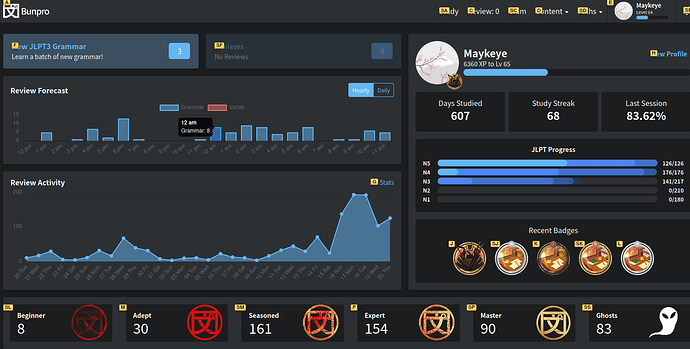Ah, this is a nice distillation of the feature request:
- For the BunPro team to add some ‘thematic decks’ (great term, @eclipse77x !)
Now, this is an especially good feature request (in my very humble opinion, if I do say so myself), especially when it’s boiled down to fairly small, utilitarian decks, because…:
In order for the dev team to make it easier for themselves to add quick, purpose-built thematic decks, they will necessarily find the need to make it easier in general to add quick, purpose-built decks. I.e. refactoring the code/database/system so that adding and working with decks (creation, editing, sorting, listing, grouping, etc.) will become much easier to do.
In general software development, all this kind of refactoring / code-improvement / reorganization without a specific goal runs the risk of becoming a lot of busy-work with no direct feedback to know if it’s really worth it. However, with a specific goal of “making it easier for us to add thematic decks”, then all that kind of refactoring has an immediate purpose and thus becomes more focused and less likely to veer off into vapourware-fantasy-land (which I speak from experience, ‘analysis paralysis’ being the bane of my software development career!  ).
).
So, if the dev team can work out some tools and interfaces to make adding thematic decks (such as the suggested BunPro Immersion Vocabulary deck) an easy and straightforward process within the website itself (i.e. rather than ‘hard-coding’ each new deck ‘by hand’ in the backend), then it would ‘just’ be a relatively simple step to open up some of those tools/interface to users to make their own small, purpose-built thematic decks. [All this is easier said than done, I understand! That’s why this is a feature request, after all!  ]
]
Or, from a different perspective, there’s another common motto in software development, which is to: “Eat your own dogfood.” In other words, instead of just mushing some stuff together and hoping the customers (the ‘dogs’) are getting what they need (a healthy and tasty ‘dogfood’), the developer (the ‘human’) directly uses the thing they expect the customer to use (i.e. ‘eating’ their own ‘dogfood’), so that they know from experience and vigorous hands-on usage that the product works well (is ‘healthy’) and also has a good, featureful, robust interface (that ‘tastes’ good).
Then, almost by magic (I said ‘almost’!) they will have developed the desired User-Definable Decks as a by-product of their own team wanting/needing tools to create small, purpose-built decks which themselves already have a good use case for existing as an additional feature that users already want/need.
It’s like, “Buy one, get one free!” Buy the “Thematic Decks (by BunPro team)” feature, get the “Thematic Decks (by anyone!)” feature for ‘free’! 
[ETA: Ah! Another common development strategy, especially in video games for instance, is for the developer to create a Level Editor, or World Editor first, which (crucially) works within the game itself. Then they use this editor to create the playable ‘levels’ or ‘world’ of the game, and disable the editor for the final game. (Of course, they can also (and often do) have a mode where the editor is re-enabled, for the players to use to create their own custom levels (e.g. to share with others to play).) Same idea here: Make a ‘deck editor’ within the website itself (but only accessible to devs/admins, initially), use it to make some small thematic decks, and then once the deck editor is working fairly well, open up partial access to it to users/customers so that they can create their own custom decks using the same deck editor the devs themselves use (but with restricted access of course).]
Anyway, this is just more brainstorming, etc.  Take what’s useful, ignore the rest!
Take what’s useful, ignore the rest!

 ).
).





